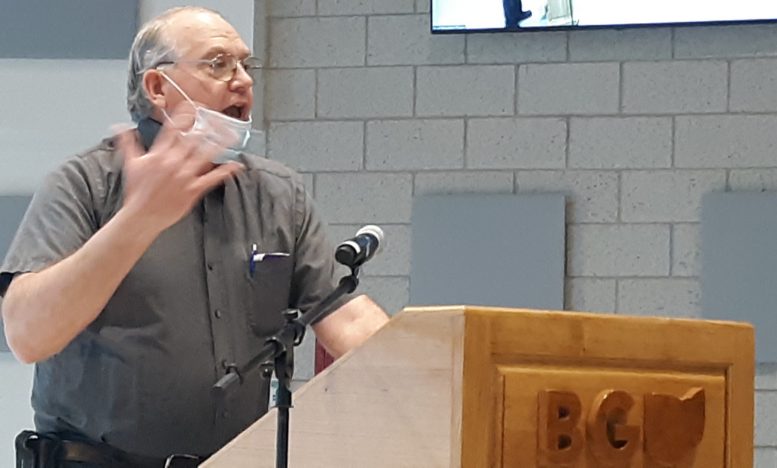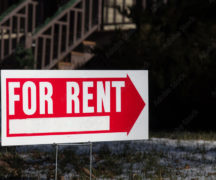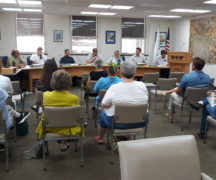By JAN LARSON McLAUGHLIN
BG Independent News
Bowling Green officials trying to make rental housing more safe in the city were accused Thursday evening of proposing un-American legislation.
With an audience of about 22 landlords and other city citizens, members of the Community Improvement Committee of City Council offered people a chance to voice their concerns about an ordinance for registration, licensure, and inspections of the 7,000 rental housing units in the city. This was the seventh time the committee invited public input – and they were met with a range of comments.
Gary Thompson, who has lived in Bowling Green for 39 years, talked about the hard work required of landlords like himself.
“It hasn’t been easy. It’s really hard,” he said. “You’ve got to work your tail off to get them ready” for tenants.
Thompson, who also owns Guaranteed Carpet Cleaning, said the Bowling Green rentals are much better than some rentals he cleans in Toledo. The possibility of licensing requirements and fees goes against his beliefs.
“That’s not the American way. That’s not the Bowling Green way,” Thompson said. “I just don’t need anybody going in and inspecting my stuff.”
Thompson suggested that rather than inspecting rental units, the city look into getting more local and federal grant money for landlords.
“If you really want to help out the landlords,” that would be the best way, he said.
But the overarching goal of the rental housing legislation isn’t to help the landlords – but rather to ensure safety of the tenants.
“The goal is safe housing,” said Jeff Dennis, who serves on the CIC with Bill Herald and John Zanfardino.
Herald pointed out that ultimately, the legislation will protect landlords and tenants.
But Zanfardino said the goal is to look out for the renters.
“There are different stakeholders here and different stakeholders want different outcomes,” he said.
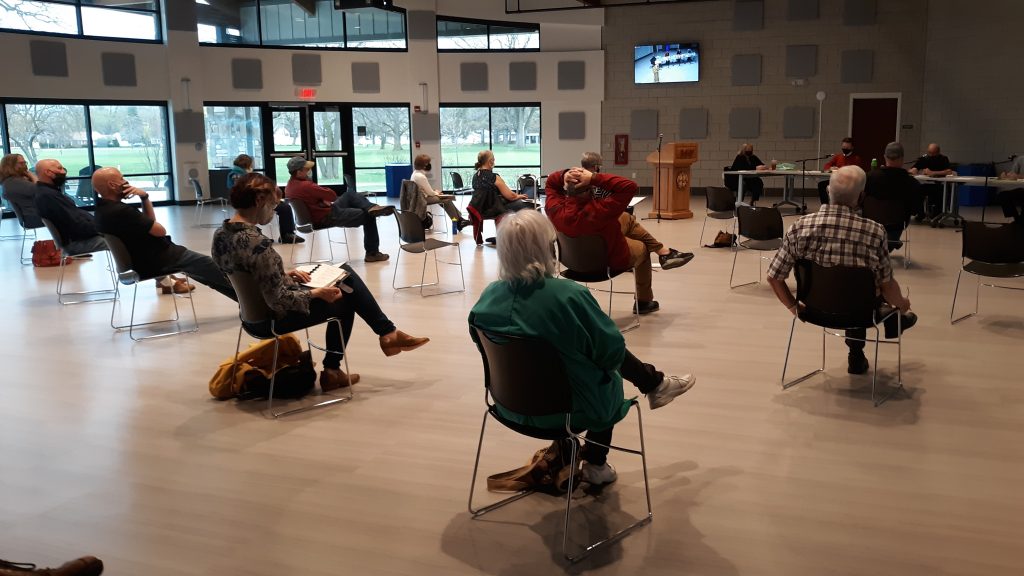
The biggest hurdle appears to be agreeing on the inspection portion of the ordinance.
Zanfardino favored random inspections, suggesting as many as 20% be inspected annually.
If the city inspects only 3% to 5% of the rentals a year, “you might as well do nothing,” he said.
Dennis favored initial inspections of all rental units – with those passing not needing to undergo more inspections for several years.
“The whole point here is to identify the bad apples,” he said. Random inspections would be an ineffective way to address a very specific problem, he said.
Dennis said if the city’s 7,000 rental units paid $10 each a year, the city could hire one employee whose job it would be to inspect rentals. The process could be self-sustaining, he said. Landlords may pass on higher rates to tenants and blame it on the city – but the expense would actually be about 83 cents a month per rental unit, he said.
Dennis suggested “start looking at the oldest properties first.”
“Our good landlords will be able to differentiate themselves from the few bad apples,” he said.
Herald supported random or targeted inspections – but not more than 20% a year.
Anything more would be “Draconian,” he said.
“I’m much more comfortable with the incremental approach,” Herald said, adding “I don’t want to overstep.”
But Dennis disagreed.
“We have tried the incremental approach for longer than I’ve been alive,” he said. It’s “insufficient to address the problem.”
Dennis pointed out that 60 other Ohio communities already have rental housing ordinances in place – including most college towns.
He predicted that 85% of the landlords in Bowling Green provide safe housing.
“It’s not going to put an undue burden on any property owner that doesn’t deserve it,” Dennis said.
Herald noted that the larger rental units in the city already undergo inspections by the city’s fire division. However, it was pointed out that smaller rentals – like houses converted into rentals – have no such requirement now. Herald asked that Fire Chief Bill Moorman be asked to speak at the next meeting on the ordinance.
Herald also spoke of the value of self-inspections by landlords. But Zanfardino said he didn’t share his confidence in self-inspections.
“Are we going to do something meaningful and significant like other college towns, or are we not?” Zanfardino asked.
Members of the public who spoke at the meeting included Rose Hess, who stressed the need for inspections. Currently, the only problems the city becomes aware of come from tenants.
“We don’t know what’s in the rentals,” Hess said. “Violations are under-reported for various reasons.”
Joan Newlove asked some nuts and bolts questions about the timing of the registrations, the fines proposed, and the paperwork that will be required.
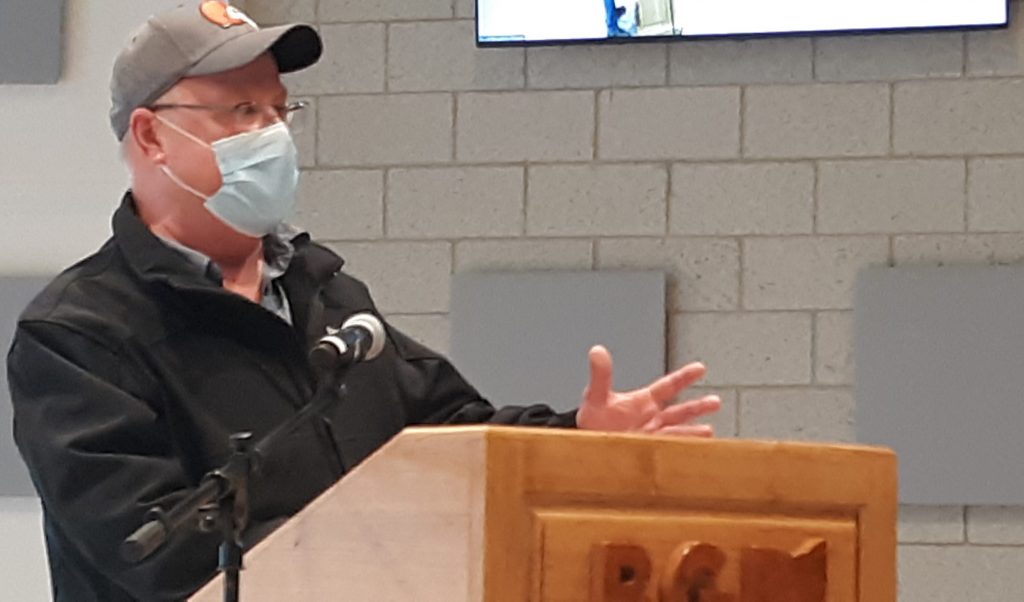
Kyle Genson talked about his one rental property that has been in his family for generations.
“Sure it’s outdated, but it’s a safe property,” he said.
“Everybody wants safe housing, and I agree,” he said.
But Genson objected to any fine being charged for those landlords who fail to register their rentals. Instead of focusing on “the stick,” he suggested that the city offer positive reinforcements.
“What can we do for carrots?” Genson said.
Dennis explained the “carrot” is the ability for Genson to differentiate his property from those owned by other landlords.
“According to what we have drafted here, you would never have to deal with us again,” once passing the initial inspection, Dennis said.
Another lingering question in the rental housing saga in Bowling Green is the definition of “bedroom.” City Attorney Mike Marsh said that the definition will be dealt with in the revamping of the city’s zoning code, and he suggested the CIC members not delay moving ahead with the rental housing legislation.
“I don’t think it has anything to do with the inspection process,” Marsh said.
Herald recommended that requiring diagrams of each rental unit would be helpful.

